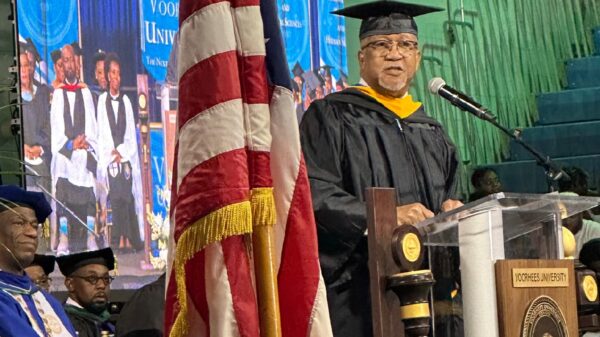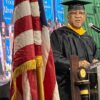By Laura Onyeneho

Black people!
What would your life look like for you and your family if you could have financial freedom right now?
The Black dollar may be very powerful, but our future generations will take the heat if we don’t have strategies.
Recent studies show that the top 10% of households own 76% of all wealth in the U.S., while the bottom 50% own just 1%. Black and Hispanic families have seen strong gains in median net worth over the years. However, white families still have three to seven times their net worth.
Can we still achieve generational wealth despite the stark statistics? Cedric Nash, founder of The Black Wealth Summit, says yes.
The award-winning entrepreneur, wealth coach, and investor’s mission to millionaire status was a slow but steady seven-year process that he took after graduating from college with no angel investor or bank. He started his career as a consultant earning less than $40,000 a year and became a millionaire at 31 years old while scaling his business ventures to $90 million in annual revenue.
He uses his knowledge to help Black people expand their knowledge and acquire the key tools to build wealth. He said the best way to close the racial wealth gap starts with investing in real estate, the market, and businesses.
The Defender spoke with Nash to discuss the factors that keep Black people behind and the smart moves we can make now to change our financial future.
Defender: What inspired you to become a mentor and advocate for building wealth in the African American community?
Cedric Nash : I had the privilege of being mentored by 4 ‘Millionaire Mentors.’ 3 were Black, and one was white. They have poured into me since the 11th grade, allowing me to learn and watch what they did. And they were very big into giving back to the community. There was one time I needed some money, and Mr. Glover [Mentor] gave it to me, and I said, no, you can’t give it to me. I’ve got to work for it. He let me clean up around his property, and once I was done, I felt like I had to repay him back. I appreciated everything. He said just pay it forward.
I believe that my work in my community is my way of paying what my four millionaire mentors paid to many others. Because of technology, I can do it at a higher level. That’s why I don’t charge people for stuff like that. We need to use our wealth to make ourselves wealthy, not those who mentor us. And if they are wealthy, why should they need the wealth of the man trying to come up?
Defender: When you say Millionaire Mentors, what does that mean? Nash: You must be someone who amassed millions of dollars in net worth. What I mean by that is, a lot of times, people mistakenly think a millionaire is a person who’s earned a million dollars in their business once in their lifetime. But it’s not about that. It doesn’t matter how much money you make; what matters is how much you keep. You often hear in magazines and studies that people who own a home tend to have more wealth, so let’s create incentives. People who own a home take money out of that home to either buy furniture, go on a vacation, or do whatever and not put it in another asset. Their net worth goes down. So, they haven’t really built wealth. I’m talking about wealth in the peer sense, and that’s what we as a community have to learn how to do. We often think about income and lifestyle and not about wealth; real assets, a few million things like apartment buildings, stocks and bonds, businesses, equity.
Defender: What critical money moves should individuals consider making in 2024 to enhance their financial well-being?
Nash: I call this my “Millionaire Money Moves” wealth system. It’s based on three components. Developing a millionaire mindset and values. The mindset is the offense, the values are the defense. That’s what people don’t talk too much about. It’s not keeping it, it’s using your money as a tool to make more money as opposed to a toy, and then be a millionaire. I wanna dig into why we are having a hard time doing what we should do to build wealth. Why are we having difficulty being consistent and staying the course? At the heart of that is our mindset and our values. Once you fix your money mindset, which is your preconceived ideas, beliefs, and practices around money, you fix your values to start treating money like a tool to make money.
It’s not just the fact that we have less access to capital. It’s not just the fact that we experience significant discrimination in the workplace that impacts how much money we can earn and how long we can earn it. But the bigger thing is what we do with what we make. It’s not necessarily the way, it’s the will. And so often, we are confused because of our history. Our response is either confusion around what to do with money or fear around investing guilt because of the way that maybe the church taught us that money’s the root of all evil. The other thing is distrust in terms of not trusting our fellow brothers and not trusting the banking system. Desperation because we’re starting from behind.
Defender: You mention the significance of investing in commercial real estate in 2024. Could you elaborate on why this is a key focus?
Nash: I really believe that real estate is a great way. I invest significantly in real estate. I’ve invested in real estate syndications. I have vacation rentals in Miami Beach. I’ve got multiple houses. I own commercial properties. It’s a great thing that creates generational wealth. You can pass it on to the next generation. The challenge is that all of these years, real estate prices have gotten significantly high. The challenges of its associated risks can be high, but it’s still doable. It’s important to learn how to analyze commercial property, know when to buy, when to walk, and how to understand financial indicators that determine whether or not you have a good deal.
Defender: What initiatives or resources do you recommend for people of color to navigate and access funds that may not be widely known?
Nash : There are four ways to get capital. The first is to inherit, and with 1.9% of Black household families with a million-dollar net worth or more, that’s unlikely. The second is that you can win the lottery. However, 70% of people who win end up broke. Third, borrow it from a bank, friend, or family. A small percentage of people can borrow from a wealthy parent, and banks don’t necessarily invest in startups. The fourth is venture capital. Less than 1% of Black businesses get capital from venture capitalists. The number one way to build up your capital is to save and invest it over time. Find ways to increase your earnings. Minimize what you spend, save, and invest as much as possible. Be patient while you’re building your idea. Get prepared to put your capital to work.
Defender: Your personal journey involves turning an inheritance into millions through strategic investments. How can others learn from your story and apply similar principles to create genuine generational wealth?
Nash : I inherited $10,000 after my grandmother died. By her death, she had $43,000 in her bank for her grandchildren. She was earning $200 a week working at a laundromat. She saved enough money to pay off her car and buy a house. I’ve adopted her saver mindset. I used my share of the money, opened my first Charles Schwab account in 1993, and invested in the stock market. I created my own consulting company, continued to invest in real estate, and turned $10,000 into millions of dollars of net worth, cash, and assets. I ended up buying the house after my grandfather got a reverse mortgage. The house is worth over $700,000, and the tenants are paying back the mortgage. Generational wealth is about what you can pass on and build upon. If we don’t instill the right mindset in the next generation, you can pass on millions, and it all goes to waste.
Defender: Can you share some key principles or strategies individuals can implement today to build wealth?
Nash : If you get a job out of college, maximize your 401k, especially if a company matches your contributions. Don’t leave free money on the table. The second thing is to save your money and live as frugally as you can.









You must be logged in to post a comment Login